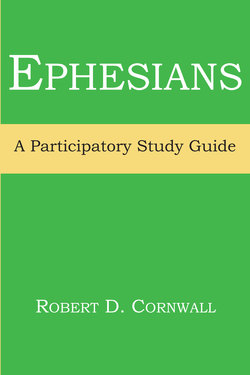Читать книгу Ephesians - Robert D. Cornwall - Страница 8
На сайте Литреса книга снята с продажи.
ОглавлениеLesson 2:
A Call to Worship
OBJECTIVE:
Participants should gain an understanding of who it is that Christians are called to worship and why. In discerning answers to these questions, participants should gain an understanding of what it means to be blessed in Christ and to be chosen by God to receive an inheritance of God’s riches and glory – both here on earth and in God’s greater future for the creation.
OPENING PRAYER:
The Ephesian letter as a whole continually reminds readers that they have been called to offer praise and thanksgiving to God in both word and deed. This first section serves as a call to worship, and thus our opening prayer serves to lead the participant into worship.
Dear Lord, it seems that you are so madly in love with your creatures that you could not live without us. So you created us; and then, when we turned away from you, you redeemed us. Yet you are God and so have no need of us. Your greatness is made no greater by our creation; your power is made no stronger by our redemption. You have no duty to care for us, no debt to repay us. It is love, and love alone, which moves you. Catherine of Siena, 1347-80 (The Complete Book of Christian Prayer, 38).
READING: EPHESIANS 1:323
Read the passage for the day in two translations, preferably one would be a traditional translation – NRSV, RSV, NIV, CEB — and the other a freer translation or paraphrase, such as The Message or the New Living Translation.
LESSON:
A CALL TO WORSHIP
Although the identity of the author, as well as the destination of this letter, remains clouded in mystery, the letter itself has a strong liturgical sense to it. That is, it serves as a call to worship the God who has blessed us with every spiritual blessing and who will ultimately gather up everything into God’s being. That is, in Christ God will be “all in all.” Whether the conversation in this letter is doctrinal or practical in nature, ultimately the letter serves as a call to worship.
The author begins by offering a blessing to the God we know in Jesus Christ, the one who has blessed us with every spiritual blessing. In fact, verses 3-14 comprise one long sentence (in the Greek), celebrating the blessings God has poured out upon Christ’s body, the church. Then, in the concluding verses of the chapter, the author offers a prayer of thanksgiving for the recipients of the letter, commending them to God for their faithfulness, and asking that they might truly experience the presence of the one who has been made head of the body, the one whom God has resurrected and exalted above all powers and authorities.
CHOSEN/DESTINED
The reader is told that God “chose us in Christ” to be holy and blameless, and God has “destined us for adoption” through Christ. The use of these two terms can be disconcerting for many Christians, especially those who come from traditions that stress human free will. How can we be free if God “chose us” before the foundation of the world and “destined us” for adoption? It is possible that our discomfort may stem from our own individualistic reading of the text. It is easy to read the text as if it is speaking to individual believers, speaking to and about our personal destinies, which appear to have already been written, and thus we have no choice in what happens in our lives. Such a reading has led theologians including Augustine and John Calvin to conclude that in God’s infinite wisdom, some who deserve condemnation will be damned and others will be redeemed, what is known as “double predestination.”
